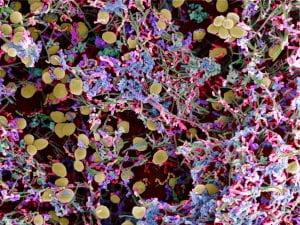By Gordon Ramage, Professor of Infection Prevention & Control, Safeguarding Health through Infection Prevention Research Group, Research Centre for Health, School of Health and Life Sciences
When you think of fungi most people imagine mushrooms. However, it is estimated that there are up to 3.8 million species, of which only 148,000 have been described. Approximately 8000 of these are known to harm animals and plants. Recently the World Health Organisation (WHO) published the first ever list of health-threatening fungi, containing 19 species with the capacity to cause significant human harm and death.
Overuse of antifungal agents in agriculture and in medicine has rendered treatments ineffective, and combined with limited diagnostics, it is not surprising that the WHO have called fungal researchers into action.
Yeasts (yellow) intertwined with bacterial cells
I am one of these researchers answering this call to arms. I have recently joined the SHIP team at GCU as a Professor of Infection Prevention and Control. I have over 23 years’ experience of working with pathogenic fungi in the US, Canada and in Scotland, and have over 200 publications in this field. I am a Fellow of the prestigious European Confederation of Medical Mycology and an honorary member of the British Society for Medical Mycology.
Recently I had the pleasure of editing a Special Issue in the journal APMIS Journal of Pathology, Microbiology and Immunology entitled fungal infection: diagnostics and therapeutics (https://onlinelibrary.wiley.com/doi/full/10.1111/apm.13350). This work brings together leaders in the field providing state-of-the-art findings and opinions on how to manage fungal infections. It is an excellent resource for the medical mycology community and those looking to get into the area.
As part of my work I have the opportunity to travel and speak to clinicians and scientists/ I have recently returned from an international meeting in Athens (Trends in Medical Mycology) where I chaired and presented my insights into the clinical management of complex fungal infections in a ‘Meet the Expert’ session. As we gear up for the World Antibiotic Awareness week I am delighted to be invited to offer my expert opinion on the 21st of November at the University of Edinburgh at an AMR meeting focussing on Antifungal Resistance (https://www.ed.ac.uk/edinburgh-infectious-diseases/news/upcoming-events/waaw-2023-antifungal-resistance). I will follow this up on the 22nd November with a presentation to the British Mycological Society talking about whether AMR significant in fungal biofilms?
As a medical mycologist there are many challenges, but as we grow our research in this area within SHIP, then we will support the battle against Killer Fungi.
To find out more about the SHIP team, head on to the GCU website, read the rest of our blogs and follow us on Twitter @SHIPGCU

